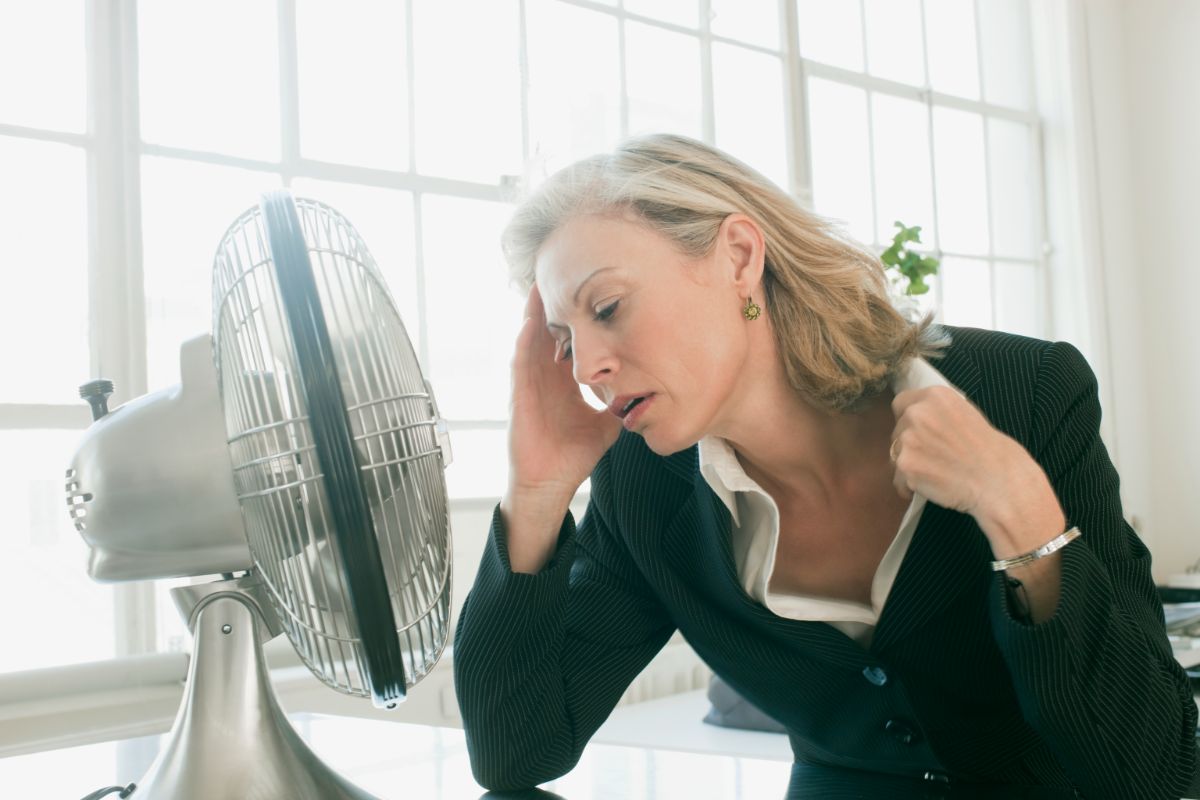Although every woman in the world will go through menopause at some point, it’s rarely discussed in the public sphere. This is unfortunate as it can leave many women feeling unprepared as they begin to experience symptoms like hot flashes, increased anxiety, and unexpected weight gain, to name just a few. Others may be confused about possible treatment options, and aren’t sure where to turn for trusted information. That’s where we can help, we’re here to tell you everything you need to know about meopause.
If you’ve been suffering from possible menopause symptoms, you’re not alone. Menopause may affect every woman differently, but one thing’s for sure: it brings a lot of changes with it. While the biology is simple enough to explain—the ovaries stop producing estrogen and progesterone, the menstrual cycle slows and eventually stops completely—the physical, emotional, and mental side effects can be more difficult to pin down.
Here at Women’s Health Specialists, we know how important it is to have accurate information on this topic from a reliable resource. With that in mind, let’s take a closer look at what you can expect from menopause and how our expert team can help you handle this transition as smoothly as possible. Keep reading below to learn more!
When is menopause likely to happen?
True menopause usually begins about a year after a woman’s last menstrual cycle. However, her periods may be irregular for several years before they cease completely. Generally speaking, most women in North America will experience natural menopause somewhere between the ages of 40 and 58, with an average age of 51. Many factors can affect the age a woman will go into menopause, but the most significant is genetics. Because of this strong genetic link, the age at which your mother experienced natural menopause can often give you some insight into when you can expect your own.
Between 1-5% of women will experience premature and early menopause. If menopause occurs before a woman is 40, it’s considered premature. If she is younger than 45 when menopause transpires, it’s described as early. Premature and early menopause can happen spontaneously, but certain medical conditions or lifestyle choices can bring them on as well. The risk factors for premature or early menopause include:
- having your ovaries removed
- having your uterus removed
- having chemotherapy or radiation
- a family history of menopause at an early age
- smoking
- medical conditions such as chromosomal abnormalities, autoimmune diseases, HIV and AIDS, etc.
Contrary to popular belief, none of these appear to determine when you will begin menopause:
- how old you were when you began your period
- the number of pregnancies you’ve had
- whether or not you’ve breastfed
- the use of hormonal birth control
One of the best ways to predict your own menopause is to track your menstrual cycle and keep an eye out for any potential symptoms, of which there are many! Your symptoms may include any of the following:
- irregular periods
- loss of libido
- mood swings
- fatigue
- hair loss or thinning hair
- hot flashes
- sweating
- racing heart
- headaches
- dizziness or vertigo
- vaginal dryness or soreness
- painful sex
- trouble getting to sleep or staying asleep
- difficulty concentrating
- memory lapses
- brain fog
- weight gain/bloating
- incontinence
- brittle nails
- changes to body odor
- depression/anxiety/irritability
- breast pain
- joint or muscle pain and tension
- digestive issues
- osteoporosis
These menopause symptoms can vary by type and severity. Some women may not feel very different at all, while others will experience life-altering changes. Your menopause journey will be unique to you (although you will of course have certain things in common with other women!)
What are the stages of menopause?
Menopause is a gradual process—you should prepare for that and not expect it to happen suddenly or all at once. It takes time for your ovaries to slow down and stop producing the estrogen and progesterone that control your menstrual cycle. There are three general stages of menopause, as outlined below.
Perimenopause—This kicks in when your estrogen and hormone levels begin dropping. It normally happens about 3-5 years before menopause, which means most women enter perimenopause in their late 40s. During this time, they may experience symptoms like
- irregular periods
- hot flashes
- sleep disturbances
- Insomnia
- night sweats
- elevated heart rate
- mood swings
- anxiety or depression
- vaginal dryness
- discomfort during sexual intercourse
- urinary complications
Although pregnancy is still possible during perimenopause, fertility is on the decline and your chances of conceiving are reduced. If you wish to avoid becoming pregnant during this time, seek out or continue to use effective birth control.
Menopause—Once you’ve missed your period for a full year without any other causes (illness, medication, pregnancy, breastfeeding, etc.) you have officially entered menopause. The total transition to menopause takes 1-3 years on average, but it may be much shorter or much longer for some women.
Postmenopause—This stage begins one year after your last menstrual cycle has passed. During this period, you may still experience certain symptoms like hot flashes, night sweats, and insomnia.
What’s the best way to cope with menopause?
Menopause is a natural biological function rather than a disease or disorder, which means we can’t prevent it from occurring. There are many ways to reduce or eliminate the symptoms associated with it, though!
Making positive lifestyle changes is an excellent place to start. Giving up unhealthy habits like smoking and drinking will benefit your whole body, and a healthy diet can have a positive effect on both your physical and mental health. Stimulants like coffee, alcohol, and chocolate are known to trigger or worsen hot flashes, so consider cutting back on these to keep the night sweats at bay.
While you’ll always reap the rewards of better health habits, women experiencing severe menopause symptoms may need help beyond that. There are many classes of medication that can ease menopause symptoms, the most effective of which tends to be hormone replacement therapy. Some hormone treatments contain just estrogen, while others are a combination of both estrogen and progesterone. These can help lessen many of the symptoms of menopause, including vasomotor symptoms like hot flashes and night sweats.
There are some risks of breast cancer and cardiovascular complications associated with long-term hormone therapy, but the benefits outweigh the risks for many women having a difficult time with intense menopause symptoms. If you’re interested in hormone replacement therapy, you should make an appointment to discuss possible options with one of our physicians.
Meet menopause head-on with help from Women’s Health Specialists
While menopause is a natural progression in a woman’s life, there’s no need to suffer from severe symptoms of it! Low levels of estrogen can impact many of your body’s systems, but we can help you find the right treatment to neutralize the worst of these transient effects.
At Women’s Health Specialists, we’re committed to providing our patients with superior obstetrical, gynecologic, and urogynecologic care for all stages of a woman’s life, including menopause. Each of our clinicians is nationally and internationally recognized for their achievements and the efforts they’ve made to advance the healthcare of women.
Our Germantown office makes it easy to get the personalized care you need—and deserve!—throughout your life. You can make an appointment with us by calling our office or schedule one online through our website.



